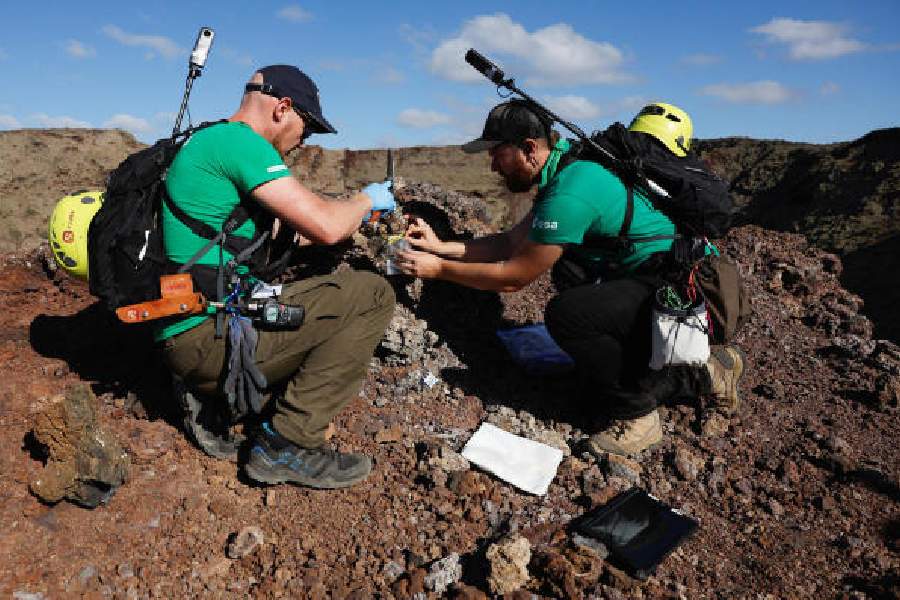Astronauts venturing unprotected on a mission to Mars might return with serious kidney damage, the largest study ever to assess the effects of spaceflight on kidney function published on Tuesday has suggested.
The study based on biochemical changes observed in astronauts and lab mice ferried into space and mice exposed to simulations of galactic cosmic radiation has found evidence for detrimental structural and functional changes in the kidneys.
“Our mouse studies suggest that the damage to their kidneys is of a kind from which they’re very very unlikely to recover,” Keith Siew, a researcher at the University College, London, and the study’s lead author told The Telegraph. “If we don’t develop new ways to protect kidneys, while astronauts could make it to Mars, they might sustain kidney damage that goes unnoticed until it is too late.”
The study is among a series of research papers by a consortium of scientists in five continents presenting fresh insights into how spaceflight affects human biology and published in Nature Portfolio journals on Tuesday.
The package of papers includes findings from samples collected from the first all-civilian crew of astronauts that flew aboard the Inspiration4 mission in September 2021 and from astronauts who have spent 180 days on the International Space Station. The four astronauts on the Inspiration4 capsule flew a three-day mission about 575km above Earth — higher than the International Space Station, which orbits between 370km and 460km above Earth.
The studies have emerged amid growing scientific discourse about prospects for human spaceflight missions to the Moon and Mars.
While experts have studied the effects of spaceflight on the human body for decades, the papers represent the most detailed compendium yet on how time in space impacts cells, genes, the immune system and human physiology.
A flagship study by Christopher Mason, professor of physiology and biophysics at Weill Cornell Medicine in the US, and his colleagues has found that short-duration low-Earth orbit Inspiration4 mission resulted in broad molecular changes that mirrored those observed during longer-duration spaceflight.
Their study noted changes in inflammatory molecules and gene-expression changes relating to the immune system and DNA damage response, among others. Although more than 95 per cent of such changes reversed within months after the mission, some changes persisted for at least three months.
They found that the short-duration mission did not pose any significant health risk for the astronauts. But other studies, including the one on kidney functions, appear to flag concerns relating to the potential hazards of space radiation exposure.
All human space missions — except for the 24 astronauts who went to the Moon — have involved low-Earth orbits where Earth’s magnetic field provides some protection from galactic cosmic radiation (GCR).
The study by Siew and his colleagues, published in the journal Nature Communications, is the first ever to look at the impacts on the kidney on mice exposed to GCR doses equivalent to what humans might get exposed to during 1.5-year or 2.5-year missions to Mars.
“At six months post exposure, we saw signs of kidney dysfunction with little blood clots in the kidneys of some of the mice,” Siew said. “We found that the tubules — the functional units in the kidneys — change their structure in response to spaceflight. This may contribute to the increase in kidney stone risk seen in spaceflight exposed people.”
The researchers say such studies are intended to help design strategies to overcome the challenges posed by exposure to space. Some options might involve chemicals called antioxidants and help combat biological stress or novel drugs that protect against the mechanisms inducing the observed changes.
Such developments, Siew said, could have “huge implications for patients on Earth, for instance, protecting healthy organs during radiotherapy for cancer patients or averting damage in the kidneys in people who have suffered acute kidney injury”.
Other papers in the package have flagged changes in gene activity linked to insulin and estrogen as well as potential hazards of space radiation exposure to certain cancers and cardiovascular disease risks.











